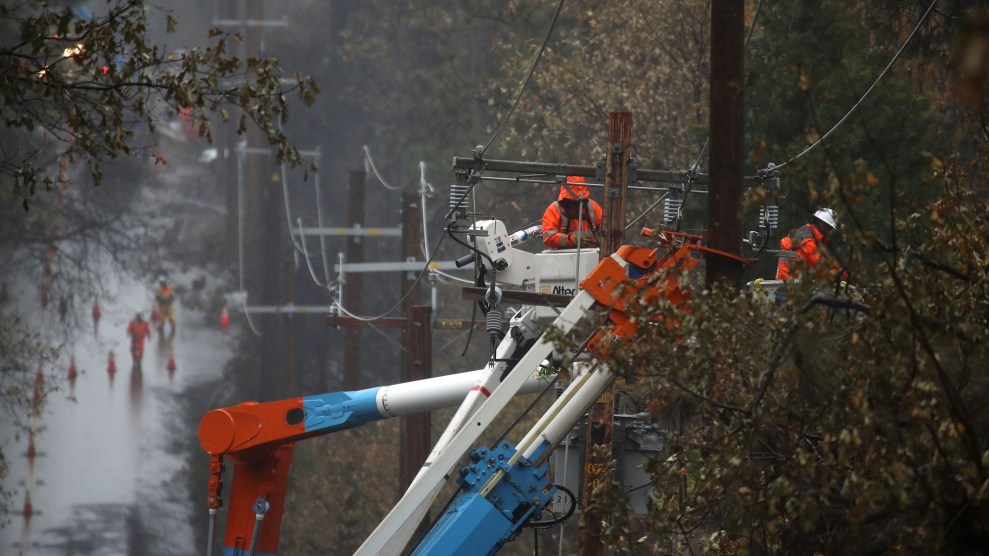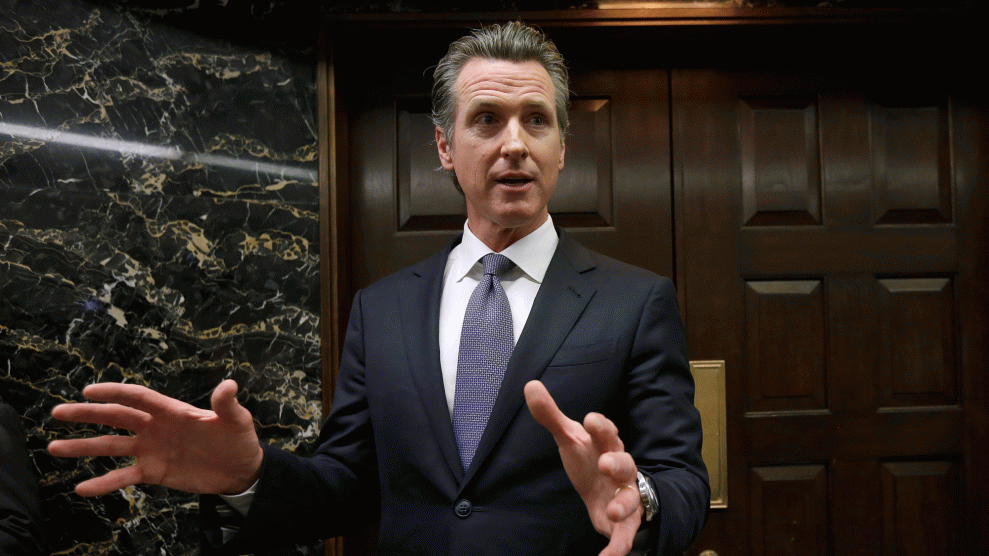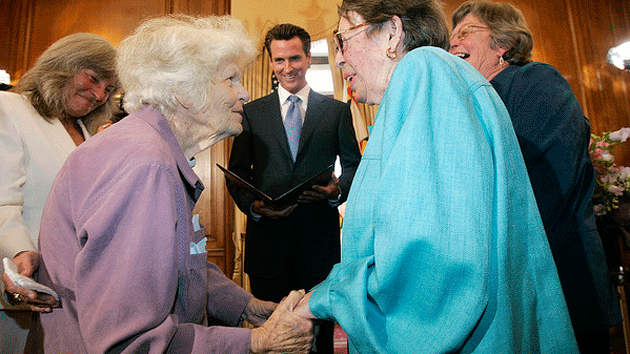Randy Economy feels “blessed.” The conservative radio broadcaster and ex-Trump campaign volunteer says he’s spending up to 17 hours per day on what he calls his life’s greatest work: the drive to kick California Gov. Gavin Newsom out of office.
From his home in Southern California’s Coachella Valley, Economy’s one-man media machine—he’s the spokesperson and senior adviser for the RecallGavin2020 campaign—has turned what was once a fringe cause pushed mainly by conspiracy theorists and right-wing radicals into a rallying cry for GOP heavyweights and a handful of Silicon Valley multimillionaires. Everyone in California is mad. Economy just has to sell them on the solution: Blame Newsom. The year-old recall campaign claims it’s collected more than 2 million signatures, well over the million-and-a-half needed to trigger a special election. If California’s counties verify enough of them, the election will likely follow by fall; a loss would make Newsom the state’s second recalled governor in two decades.
A white man in his early 60s, often in suit and tie, Economy (yes, his real name) could pass for any conservative talking head if it weren’t for his signature eye patch, first donned after a stroke cost him his right eye. Replaced by glasses in his daily life, it’s still essential to his image: “He wears an eye patch but can spot fake news a mile away, like a superhero pirate,” an announcer booms in the bombastic intro to his Saturday morning show on KABC, the Los Angeles–based conservative station that also hosts the Ben Shapiro Show. (Economy’s LinkedIn profile says he’s fluent in “Pirate.”)
Economy’s start in politics began in the 1980s, after a stint as a newspaper reporter, when he landed a gig as a flack for the Los Angeles suburb of Norwalk. That led to a job managing the city council campaign of now-Rep. Grace Napolitano (D-Calif.), and by 1988, Economy was mounting his own run for city council. He lost that race, along with a later one for the local school board. (He did, though, win a few rounds of the never-aired NBC game show Oddball.)
Although Economy’s bids for office went nowhere, he learned something about how to court influence and power from the sidelines. In 2003, he served as a member of the Los Angeles County Democratic Party representing his hometown of Cerritos. It’s in that capacity that Economy says he was in the Los Angeles hotel ballroom where Gray Davis, California’s governor from 1999 to 2003, found out he’d lost the first gubernatorial recall election to Republican political novice Arnold Schwarzenegger.
By 2010, Economy was back in journalism, working the corruption beat for a Cerritos newspaper. But that second act took a turn after a county official hit the paper with a defamation suit. Economy, who by then was employed elsewhere, wrote in a sworn declaration that he’d manufactured fake news to “discredit, defame, embarrass, belittle, smear and otherwise destroy the reputation” of members of a municipal water board. (The publisher denied wrongdoing, and the suit was eventually dismissed.) His LinkedIn profile describes him as a Pulitzer Prize nominee, though his submissions received “no recognition,” the Coachella Valley Desert Sun found.
In the runup to the 2016 election, Economy says he was lured by Donald Trump’s rapport with the “average” voter. “I don’t agree with a lot of things that he did,” Economy told me, “but when you get involved at a senior level in this business of politics, it’s multilayered.” He soon began working with the Trump campaign in California, even flying to Cleveland to attend the Republican National Convention. That opportunity led to others: Ahead of the 2020 election, Economy advised the long-shot GOP challenger to impeachment manager Rep. Adam Schiff.
Newsom first entered Economy’s crosshairs when the governor rolled out his response to the pandemic. When he signed a covid-related order halting intake at state prisons in March 2020, and later allowed the early release of more than 3,000 people, Economy was enraged. “You cannot arbitrarily lock people into their houses like prisoners and let prisoners out of jail,” he told me, still fuming nearly a year later.
Then came the French Laundry incident. Days before announcing that the state would go back on lockdown in November, Newsom was seen wining and dining with at least a dozen people at the Michelin-starred Napa Valley restaurant. That was a “defining point” for Economy: The subsequent flash of public fury convinced him that Newsom was ripe for a takedown. A recall petition had been filed by a retired police sergeant named Orrin Heatlie in February 2020, a week and a half before Newsom first declared a state of emergency. Economy met with Heatlie and became a full-time anti-Newsom crusader, turbocharging the recall campaign. (He’s since launched a second KABC show with Heatlie and another recall leader called Friday Night at the French Laundry.)
Like the challenge to unseat Schiff, who won by 45 points, the Newsom recall has the look of a lost cause—not least because of its connections to the far right. Politico reported that Heatlie posted anti-immigrant vitriol and supported pandemic conspiracy theories on social media; the Los Angeles Times uncovered posts by the recall campaign’s chief financial officer arguing that antifa was responsible for the January 6 attack on the Capitol. The California Patriot Coalition, which is paying to circulate the petition to collect signatures to get the recall on the ballot, is part of a nationwide extremist network linked to acts of vigilantism and street violence during last summer’s protests in Portland, Oregon.
“I don’t think we’re going to turn away support from anybody, and nor should we because California does come in all shapes and sizes,” Economy said when I asked about the links between the recall movement and backers of the QAnon conspiracy and Capitol insurrection. He did condemn a recent anti-vaccine protest that had temporarily halted vaccinations at Dodger Stadium in Los Angeles.
Economy is right about at least one thing: The pandemic has led to widespread political disaffection, much of it directed at Newsom. Californians are upset with the governor for imposing either too many or too few restrictions—and everybody is pissed about the French Laundry. Newsom’s approval ratings plummeted from 64 percent in September to just 46 percent in February. After months of scrambling to please frustrated Californians by accelerating vaccine rollouts, striking deals to resume in-person schooling, and allowing many businesses to reopen, Newsom finally acknowledged the threat in March with an explicit anti-recall campaign featuring endorsements from Sen. Bernie Sanders, Stacey Abrams, and other Democratic stars.
Newsom’s opponents still see an opening. Former state GOP chair Tom Del Beccaro has revived Rescue California, the long-defunct pac that helped recall Davis in 2003. (Del Beccaro has published opinion pieces in the pro-Trump Epoch Times referring to the coronavirus as the “CCP [Chinese Communist Party] virus.”) Some of the recall campaign’s biggest monetary backers are Silicon Valley moguls dissatisfied with the state’s attempts to regulate Big Tech. Billionaire investor and Golden State Warriors part-owner Chamath Palihapitiya donated $100,000 to the effort—even hinting at his own plans to challenge Newsom. (Palihapitiya has since said he won’t run.) Venture capitalist Doug Leone and his wife have also donated about $100,000 to the recall effort. Former PayPal executive David Sacks donated $65,000.
Former tech journalist Greg Ferenstein says that moves like Palihapitiya’s are “pretty typical of neophyte tech people,” who often lack the political expertise to parlay their immense wealth into electoral power. “I think the recall effort is largely isolated people in the tech industry, who are using it as an excuse to advance their kind of pet projects or individual ambitions,” he says. More prominent Silicon Valley billionaires have remained quiet, or, like Netflix CEO Reed Hastings, have donated to Newsom’s reelection campaign.
Though Republican notables like former San Diego Mayor Kevin Faulconer and 2018 gubernatorial candidate John Cox have signaled plans to challenge Newsom in any special election, Economy says the recall campaign won’t endorse a candidate. And despite the wave of financial support from the California Republican Party, Economy insists the campaign doesn’t explicitly align itself with the GOP.
Even if Newsom weathers the storm, Economy might still claim success for helping to forge a new coalition of lockdown-weary Californians, big businesses, and Silicon Valley’s right wing—giving the state’s beleaguered GOP a shot in the arm ahead of 2022’s elections. And Democrats would be wise not to write off RecallGavin just yet. “I saw it coming,” Economy says of the 2003 recall election, an upset that shocked many Californians. “And now the same thing is happening. Gavin Newsom is no different than Gray Davis. I just happen to be on the other side now, and that’s kind of fun.”
This article has been revised and updated after a print version was featured in our May/June 2021 issue.













